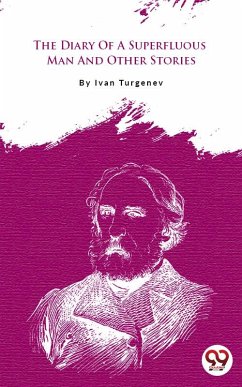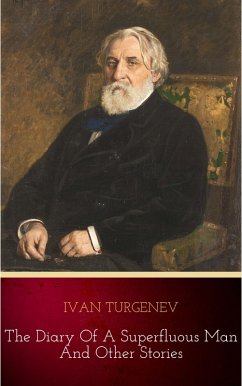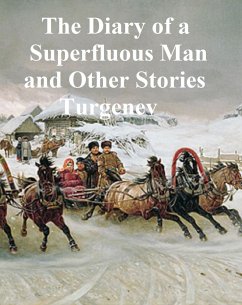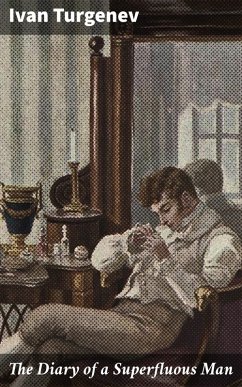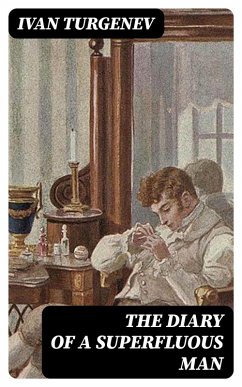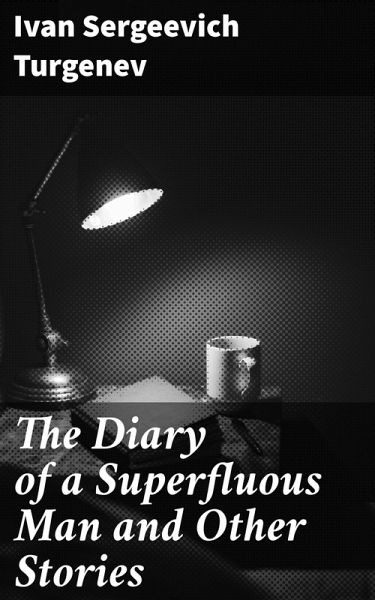
The Diary of a Superfluous Man and Other Stories (eBook, ePUB)
Enriched edition. Tales of Emotional Struggles and Societal Complexities in 19th-Century Russia
Kommentar: Kirkland, Jenna / Redaktion: Good Press / Übersetzer: Garnett, Constance

PAYBACK Punkte
0 °P sammeln!
In "The Diary of a Superfluous Man and Other Stories," Ivan Sergeevich Turgenev deftly explores the internal struggles of his characters within the social and psychological confines of 19th-century Russia. Through a series of poignant narratives featuring the disillusioned aristocrat, the 'superfluous man,' Turgenev employs a lyrical, yet precise prose that illuminates the themes of existential angst and social alienation. His writing reflects the influences of European literary movements like Romanticism and Realism, while also engaging with the philosophical undercurrents prevalent in Russia...
In "The Diary of a Superfluous Man and Other Stories," Ivan Sergeevich Turgenev deftly explores the internal struggles of his characters within the social and psychological confines of 19th-century Russia. Through a series of poignant narratives featuring the disillusioned aristocrat, the 'superfluous man,' Turgenev employs a lyrical, yet precise prose that illuminates the themes of existential angst and social alienation. His writing reflects the influences of European literary movements like Romanticism and Realism, while also engaging with the philosophical undercurrents prevalent in Russian literature, making it a pivotal work in understanding the period's socio-political struggles. Turgenev, a preeminent figure in Russian literature, was born into a declining noble family, which instigated his fascination with class structure and personal identity. His experiences as a dual citizen of both Russia and Western Europe informed his perspective on the tensions between tradition and modernity. This contextual backdrop shaped his characters, often fraught with indecision and despair, as they navigated a society in flux. Turgenev's firsthand encounters with revolutionary thinkers further deepened his exploration of human relationships and societal change. This collection is a must-read for anyone interested in understanding the intricacies of human emotions and the sociopolitical landscape of 19th-century Russia. Turgenev's incisive character studies and reflections on the human condition resonate universally, making this anthology not just a mere reflection of its time but a timeless exploration of the contradictions inherent in the human experience. In this enriched edition, we have carefully created added value for your reading experience: - A comprehensive Introduction outlines these selected works' unifying features, themes, or stylistic evolutions. - The Author Biography highlights personal milestones and literary influences that shape the entire body of writing. - A Historical Context section situates the works in their broader era-social currents, cultural trends, and key events that underpin their creation. - A concise Synopsis (Selection) offers an accessible overview of the included texts, helping readers navigate plotlines and main ideas without revealing critical twists. - A unified Analysis examines recurring motifs and stylistic hallmarks across the collection, tying the stories together while spotlighting the different work's strengths. - Reflection questions inspire deeper contemplation of the author's overarching message, inviting readers to draw connections among different texts and relate them to modern contexts. - Lastly, our hand-picked Memorable Quotes distill pivotal lines and turning points, serving as touchstones for the collection's central themes.
Dieser Download kann aus rechtlichen Gründen nur mit Rechnungsadresse in A, B, BG, CY, CZ, D, DK, EW, FIN, F, GR, H, IRL, I, LT, L, LR, M, NL, PL, P, R, S, SLO, SK ausgeliefert werden.




